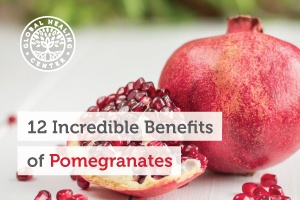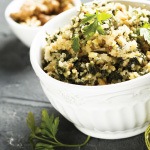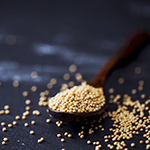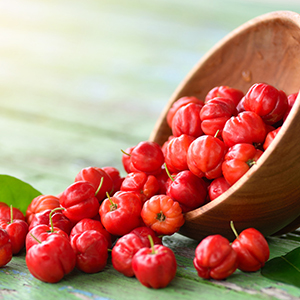
Pomegranates have exploded in popularity in recent years and it’s due to their ever-growing list of amazing health benefits. Rich in nutrients such as vitamin C, vitamin E, magnesium, potassium, and antioxidants, pomegranates defend against free radicals, soothe irritated tissue, and promote healthy aging. Best of all, pomegranates are as delicious as they are nutritious. Let’s look at some of the incredible health benefits of pomegranates.
Best Pomegranate Benefits
1. Pomegranates Are a Dense Source of Nutrients
Pomegranates are bursting with vitamins and minerals. Pomegranate seeds, sometimes referred to as arils, are a great source of fiber and micronutrients. Below is a nutritional breakdown for one cup of pomegranate arils.
| 1 Cup Pomegranate Seeds (Arils) *g=grams *mg=milligrams | |
|---|---|
| Nutrient | Amount |
| Protein | 2.91 g |
| Carbohydrates | 32.54 g |
| Fiber | 7 g |
| Sugar | 23.79 g |
| Minerals | |
| Iron, Fe | 0.52 mg |
| Magnesium, Mg | 21 mg |
| Phosphorus, P | 63 mg |
| Potassium, K | 411 mg |
| Sodium, Na | 5 mg |
| Vitamins | |
| Vitamin C | 17.7 mg |
| Thiamin | 0.117 mg |
| Riboflavin | 0.092 mg |
| Niacin | 0.51 mg |
| Vitamin B6 | 0.13 mg |
| Vitamin E | 1.04 mg |
| Vitamin K | 28.5 mg |
2. Pomegranates Contain Powerful Antioxidants
Pomegranates contain anthocyanins and punicalagins — both powerful antioxidants.[1] A balanced diet rich in foods that contain antioxidants may help reduce free radical damage. Excessive free radicals can lead to serious health concerns and accelerate cellular aging. Some research even suggests that pomegranates support normal tissue growth at the cellular level.[2, 4]
3. Pomegranates Promote Cellular Integrity
The cells in your body are constantly bombarded by chemical and biological agents that cause oxidative stress. Oxidative stress triggers the release of 8-Oxo-DG — something that you definitely don’t want. High levels of 8-Oxo-DG usually accompany muscle weakness, decreased liver function, skin aging, and reduced brain function. Studies suggest that people who eat pomegranates or supplement with pomegranate extract have lower levels of 8-Oxo-DG.[4]
4. Pomegranates Encourage Healthy Aging
Pomegranates contain polyphenols known as ellagitannins. When ellagitannins are metabolized, the metabolite urolithin A (UA) is produced. Studies reveal that UA can fight the effects of age-related decline and help preserve exercise capacity and muscle function. It’s believed that UA does this by supporting normal mitochondrial function.[5]
5. Pomegranates Support Brain Health and Memory
Advanced glycation end products (AGEs) occur when protein and fat molecules bond with a sugar molecule. They occur naturally when foods like meat, eggs, and poultry are cooked at high temperature. Scientists believe AGEs play a role in the onset of neurological decline, type-II diabetes, and Alzheimer’s disease. The appropriately abbreviated “AGEs” accelerate aging at the cellular level. Remember the punicalagins? They can inhibit AGEs from forming in food or mitigate the effects of AGEs in the body altogether.[6]
6. Pomegranates Help Protect Against Harmful Organisms
Some evidence suggests that pomegranate rind extract may defend against harmful organisms. According to one study, a preparation that included pomegranate improved the outcome of treatment plans that addressed antibiotic-resistant bacteria.[7] Another study found that pomegranate peel contains phytochemicals that encourage fungal balance.[8]
7. Pomegranates Soothe Red, Irritated Tissue
When the tissue inside of your body is red and irritated, it can negatively affect your health and wellness. Some compounds in pomegranates, such as polyphenols, can help soothe irritation.[9] It’s believed that reducing systemic irritation can promote overall wellness and help protect against many serious health conditions. A double-blind, placebo-controlled study of 48 obese and overweight participants found that pomegranate supplementation reduced systemic irritation.[10]
8. Pomegranates Support Heart Health
Some reports suggest punicalagins positively affect the heart and vascular system. One study had ten participants drink one ounce of pomegranate juice every day for a year. At the end of the study, participants’ blood pressure was an average of 12% lower and atherosclerotic plaque levels dropped 30%.[11]
9. Pomegranates Contribute to Prostate Health
Lycopene is a phytochemical found in red colored fruits and vegetables like pomegranates, tomatoes, and watermelons. According to one study, people who consumed a diet rich in lycopene had better prostate health.[12] Lycopene is one of several phytochemicals found in pomegranates that appear to nutritionally support the prostate.[13]
10. Pomegranates May Help With Joint Health
Osteoarthritis is a common and painful condition. In a study of people with knee osteoarthritis, scientists found that drinking pomegranate juice improved knee function and reduced the breakdown of cartilage.[14] Similar studies found that adding pomegranates to the diet of individuals with active rheumatoid arthritis supported overall wellness.[15]
11. Pomegranates Can Boost Exercise and Performance
Pomegranates may help you perform better. One study found that taking pomegranate extract 30 minutes before a workout could help enhance blood flow and delay fatigue during exercise.[16] Another study linked drinking pomegranate juice to better recovery following strength training.[17]
12. Pomegranates May Improve Your Mood
Research suggests pomegranates may aid mental and emotional health. In a study involving both men and women, drinking pomegranate juice improved participants outlook, mood, and response to anxiety.[18]
How to Add Pomegranates to Your Diet
There are many ways to incorporate pomegranates into your diet.
Eat Raw, Organic, Locally-Grown Pomegranates
Be conscious of where your food comes from and how it is grown. Eating organic food, especially pomegranates, is a fantastic foundation for everyone. The seeds of the pomegranate are a nutritious, crunchy snack and pomegranate juice is an easy way to obtain antioxidants and nutrients.
Can’t Buy Organic? Grow Your Own!
When organic fruits and vegetables are not readily available, grow your own. The pomegranate tree does best when planted in well-drained soil. Although it can grow in partial shade, this fruit-bearing tree loves full sun and warmth and is fairly drought tolerant.
It’s best to buy pomegranate cuttings from a local nursery. Look for cuttings approximately fifteen inches in length. Don’t expect to harvest fruit right away, you’re going to need a little patience. Pomegranate trees yield fruit approximately three years after planting. The red, bulbous fruit of the pomegranate should be harvested when the color is a deep red hue. You can also tap the fruit to listen for a tinny, metallic sound that indicates it’s ripe. A pomegranate tree of average size can yield approximately 8-10 fruits per crop and should produce two to three crops per year.
References (18)
- Kulkarni AP1, Mahal HS, Kapoor S, Aradhya SM. In vitro studies on the binding, antioxidant, and cytotoxic actions of punicalagin. J Agric Food Chem. 2007 Feb 21;55(4):1491-500.
- Khan N, Hadi N, Afaq F, Syed DN, Kweon MH, Mukhtar H. Pomegranate fruit extract inhibits prosurvival pathways in human A549 lung carcinoma cells and tumor growth in athymic nude mice. Carcinogenesis. 2007;28(1):163-73.
- Zarfeshany A, Asgary S, Javanmard SH. Potent health effects of pomegranate. Adv Biomed Res. 2014;3:100.
- Freedland SJ, Carducci M, Kroeger N, et al. A double-blind, randomized, neoadjuvant study of the tissue effects of POMx pills in men with prostate cancer before radical prostatectomy. Cancer Prev Res (Phila). 2013;6(10):1120-7.
- Ryu D, Mouchiroud L, Andreux PA, et al. Urolithin A induces mitophagy and prolongs lifespan in C. elegans and increases muscle function in rodents. Nat Med. 2016.
- Liu W, Ma H, Frost L, Yuan T, Dain JA, Seeram NP. Pomegranate phenolics inhibit formation of advanced glycation endproducts by scavenging reactive carbonyl species. Food Funct. 2014;5(11):2996-3004.
- Gould SW, Fielder MD, Kelly AF, Naughton DP. Anti-microbial activities of pomegranate rind extracts: enhancement by cupric sulphate against clinical isolates of S. aureus, MRSA and PVL positive CA-MSSA. BMC Complement Altern Med. 2009;9:23.
- Pai MB, Prashant GM, Murlikrishna KS, Shivakumar KM, Chandu GN. Antifungal efficacy of Punica granatum, Acacia nilotica, Cuminum cyminum and Foeniculum vulgare on Candida albicans: an in vitro study. Indian J Dent Res. 2010;21(3):334-6.
- Zarfeshany A, Asgary S, Javanmard SH. Potent health effects of pomegranate. Adv Biomed Res. 2014;3:100.
- Hosseini B, Saedisomeolia A, Wood LG, Yaseri M, Tavasoli S. Effects of pomegranate extract supplementation on inflammation in overweight and obese individuals: A randomized controlled clinical trial. Complement Ther Clin Pract. 2016;22:44-50.
- Aviram M, Dornfeld L, Rosenblat M, et al. Pomegranate juice consumption reduces oxidative stress, atherogenic modifications to LDL, and platelet aggregation: studies in humans and in atherosclerotic apolipoprotein E-deficient mice. Am J Clin Nutr. 2000;71(5):1062-76.
- Pisipati SV, Pathapati H, Bhukya G, et al. Lycopene: redress for prostate cancer. J Basic Clin Pharm. 2012;3(2):261-4.
- Adams LS, Seeram NP, Aggarwal BB, Takada Y, Sand D, Heber D. Pomegranate juice, total pomegranate ellagitannins, and punicalagin suppress inflammatory cell signaling in colon cancer cells. J Agric Food Chem. 2006;54(3):980-5.
- Ghoochani N, Karandish M, Mowla K, Haghighizadeh MH, Jalali MT. The effect of pomegranate juice on clinical signs, matrix metalloproteinases and antioxidant status in patients with knee osteoarthritis. J Sci Food Agric. 2016;96(13):4377-81.
- Ghavipour M, Sotoudeh G, Tavakoli E, Mowla K, Hasanzadeh J, Mazloom Z. Pomegranate extract alleviates disease activity and some blood biomarkers of inflammation and oxidative stress in Rheumatoid Arthritis patients. Eur J Clin Nutr. 2016.
- Trexler ET, Smith-ryan AE, Melvin MN, Roelofs EJ, Wingfield HL. Effects of pomegranate extract on blood flow and running time to exhaustion. Appl Physiol Nutr Metab. 2014;39(9):1038-42.
- Trombold JR, Reinfeld AS, Casler JR, Coyle EF. The effect of pomegranate juice supplementation on strength and soreness after eccentric exercise. J Strength Cond Res. 2011;25(7):1782-8.
- Emad Al-Dujaili & Nacer Smail. Pomegranate juice intake enhances salivary testosterone levels and improves mood and well being in healthy men and women. Endocrine Abstracts (2012) 28 P313.
†Results may vary. Information and statements made are for education purposes and are not intended to replace the advice of your doctor. If you have a severe medical condition or health concern, see your physician.







